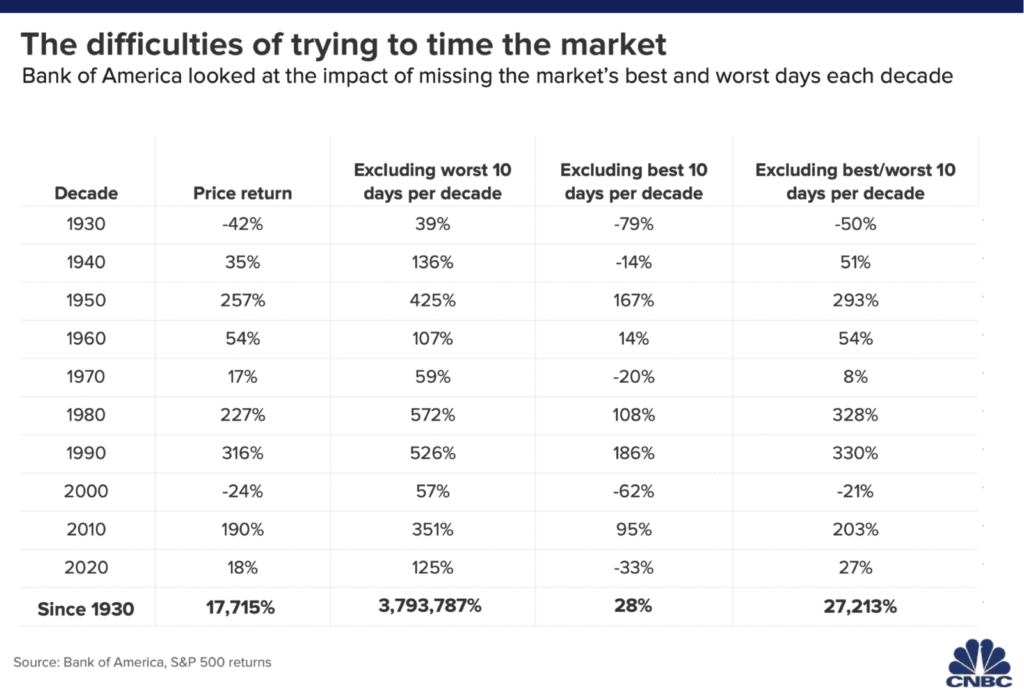|
Getting your Trinity Audio player ready...
|
So you want to invest in the stock market, but you’re not sure where to start. We’ve got you covered.
Within this blog, we’ll explore:
- What the stock market is
- Different ways of investing in the stock market
- How to invest in the stock market and make money
- How to seek professional advice
What is the Stock Market?
The stock market is a market in which ownership of companies are bought and sold. When a company decides to ‘go public’, they sell ownership of the company to the public on the stock market.
Most companies decide to go public to raise capital from investors. This capital can be used to grow the company, raising cash to expand or enhance their operation.
A company will issue a number of shares (pieces of ownership in the company) onto the stock market. Once they are there, the company can be bought and sold by investors. Investors, in-term, hope that their investment will grow. They generally hope for two forms of growth from their investment, described below.
Share price growth
The first type of growth is share price growth. The share price of a company can rise and fall; this is dependent on how much capital is held within the shares. The more capital that is invested into the shares, the higher the value will be.
When a company publishes strong figures, strikes a big deal, releases exciting new technology or expands into a new market, the share price may increase. This happens because more investors look to benefit from the company’s success.
Conversely, a company’s share price can drop on the release of bad news, including:
- Poor sales figures
- Product failure news
- The emergence of a competitor
- Public scandal
Investors must be aware that any company can see its share price fall sharply should any of the above happen.
Dividend payments
The second type of growth investors seek from stock ownership is dividend payments. A dividend is a payment from a company to its shareholders (owners of stock). This payment, which is usually quarterly or annually, is the company sharing profits with their shareholders.
Not all companies pay dividends. So it’s worth knowing whether or not you can expect a dividend payment before investing in a company.
Different ways of investing in the stock market
There are several ways in which an individual can invest in the stock market.
| Explanation | Pros | Cons | |
| Direct stock ownership | Directly owning individual shares in a company, for example, Apple (NASDAQ: AAPL) | High potential return. Ability to purchase companies you believe in. Quick to buy & sell No annual management cost. | High potential loss. Can lead to over-exposure in one company. High amount of research time required. Emotional investing can lead to losses if bought/sold at the wrong time. |
| ETFs | Buying into and tracking an entire market, for example, the S&P 500 | Low-cost solution Exposure to an entire stock market. Well diversified across different sectors. Little research required. Consistent long-term growth. | Can become overexposed to an individual country or sector. Potentially slower growth. Dividend payments may be lower than owning direct stocks. |
| Mutual Funds | A mutual fund is an actively managed fund that will invest into a basket of stocks which the fund manager believes will outperform the entire market | Can outperform the market. Active manager monitoring your investment. Offsets the requirement for market research onto the fund manager. | May not outperform the market. Can be expensive. You may not agree with the choices the fund manager makes. |
| Structured Products | Buying a basket of stocks with fixed upside and inbuilt downside protection | Exposure to three of four leading stocks. Fixed returns dependent on the underlying company’s stock performance. Income security. Downside market protection. Ability to make money in flat, rising or slightly falling market. | Funds locked until the product matures. Underlying companies can drop below the income barrier. Higher entry barrier ($10,000). |
How to invest in the Stock Market and make money
Investors all hope to grow their capital when investing in the stock market. The trade-off is the desire to achieve capital appreciation in exchange for the risk of losing money. There is no risk-free way of investing in the stock market; if there was, everyone would do it. However, there are certain tried and tested methods that investors rely upon.
Portfolio diversification
One of the most important rules for investing in the stock market is diversification. You may love a company and believe in it completely. However, it is generally seen as unwise to put all your eggs in one basket. By spreading your investments across several companies, you mitigate the risk of one company’s share price value falling.
Dollar-cost averaging
Markets move up and down over time but generally in an upward direction. When there are peaks and troughs in the market, cheaper buying positions emerge. Investing regularly in the stock market allows investors to benefit from market downturns by buying at a lower price.
Time in the market, not timing the market
For investors, one of the most important rules is to stay in the market for a long period. Attempting to time the market is dangerous, as it can lead to investors missing the best days in the market. The table below shows how investors would fare if they missed the ten best days in the market since 1930.

How to start investing in the stock market
There are various investment vehicles available. These are the platforms on which investors can buy and sell investments. These range from basic trading accounts available on your smartphone to tax-sheltered offshore trust vehicles.
Different vehicles are designed for different types of investors with ranging risk attitudes, amounts of investable capital and time horizons. Moreover, certain investors wish to actively manage their investments; these investors may require execution-only accounts, other investors wish to have their investments handled for them. Finally, certain investors may want or need to invest on a regular basis, others opt for a one-off lump-sum vehicle.
All of this can seem daunting. To get the best understanding of what type of investment vehicle you require and what investments to hold within, we recommend you speak with a financial advisor. An advisor will conduct a fact-find with you to understand your current financial situation, your goals and core priorities. Once a full picture is established, bespoke recommendations can be made.
Click here to arrange a meeting with a financial advisor.



